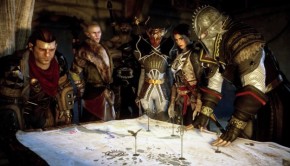Luxuria Superbia: Push My Buttons
 Noted sex advice columnist Dan Savage believes an ideal lover should be GGG, or Good, Giving and Game: exhibiting skill, sympathetic to another’s needs, and open to creative experimentation. He also proposed the “campsite rule” for relationships between consenting adults: you should leave your lover at least as emotionally and physically healthy as they were when you started seeing them. Basically, a good lover should be attentive, encouraging, kind-hearted and open-minded.
Noted sex advice columnist Dan Savage believes an ideal lover should be GGG, or Good, Giving and Game: exhibiting skill, sympathetic to another’s needs, and open to creative experimentation. He also proposed the “campsite rule” for relationships between consenting adults: you should leave your lover at least as emotionally and physically healthy as they were when you started seeing them. Basically, a good lover should be attentive, encouraging, kind-hearted and open-minded.
Video games are terrible lovers.
 The poster child for terrible video game “romance” is Bioware. A successful relationship in Mass Effect or Dragon Age requires you stop thinking of your party members as people, and view them instead as a bundle of algorithmic wants and needs to be mechanically separated. It’s never about what you want, it’s only about what they want. So you say what they want to hear, send them the gifts they want most, and in the end, an invisible bar fills up: hooray, sex! It’s just another puzzle to be solved, one more equation to be balanced.
The poster child for terrible video game “romance” is Bioware. A successful relationship in Mass Effect or Dragon Age requires you stop thinking of your party members as people, and view them instead as a bundle of algorithmic wants and needs to be mechanically separated. It’s never about what you want, it’s only about what they want. So you say what they want to hear, send them the gifts they want most, and in the end, an invisible bar fills up: hooray, sex! It’s just another puzzle to be solved, one more equation to be balanced.
 It’s also a singularly depressing view of human relationships. The lesson of Bioware is that enough flattery, lies and bribery can break anyone’s will, and that the value of a relationship is measured only in how quickly someone gets dragged into bed. When I played Dragon Age: Origins, I felt like the game was actually turning me into a worse person. I was role-playing a pansexual psychopath who would abuse his party members’ trust for 10 points of Gamerscore, and I didn’t much like it. Through conversations and gameplay, I’d been taught that these characters didn’t care about anything but their own wants and needs. Is it any wonder I responded with the same dispassionate cruelty? Two liars who fuck then never talk again: that’s love, Bioware style.
It’s also a singularly depressing view of human relationships. The lesson of Bioware is that enough flattery, lies and bribery can break anyone’s will, and that the value of a relationship is measured only in how quickly someone gets dragged into bed. When I played Dragon Age: Origins, I felt like the game was actually turning me into a worse person. I was role-playing a pansexual psychopath who would abuse his party members’ trust for 10 points of Gamerscore, and I didn’t much like it. Through conversations and gameplay, I’d been taught that these characters didn’t care about anything but their own wants and needs. Is it any wonder I responded with the same dispassionate cruelty? Two liars who fuck then never talk again: that’s love, Bioware style.
 So. Luxuria Superbia. It’s the latest art game from Belgian wunderkinder Tale of Tales, though it leans more toward the “game” side than the studio’s previous offerings. It’s got levels, scores, heck, even controller support! It combines the rail-shooter synesthesia of Rez, the psychedelic colors and imagery of Katamari Damacy, and the relaxing rhythm of Everyday Shooter. Also, Luxuria Superbia is a game about having sex with a flower, or maybe your computer. You are definitely having sex with something.
So. Luxuria Superbia. It’s the latest art game from Belgian wunderkinder Tale of Tales, though it leans more toward the “game” side than the studio’s previous offerings. It’s got levels, scores, heck, even controller support! It combines the rail-shooter synesthesia of Rez, the psychedelic colors and imagery of Katamari Damacy, and the relaxing rhythm of Everyday Shooter. Also, Luxuria Superbia is a game about having sex with a flower, or maybe your computer. You are definitely having sex with something.
 There is a garden filled with white flowers. Each flower is an endless tunnel with its own shape, imagery, and music. You restore color to the wilted flower by touching its walls. The more colorful the walls, the faster your score increases. Suggestive text appears on screen (“I need you to pollinate me.”) There’s a catch, however: restore every wall completely, and the stage ends prematurely. Or: You want the flower edging for as long as possible before you make it come. That is the game.
There is a garden filled with white flowers. Each flower is an endless tunnel with its own shape, imagery, and music. You restore color to the wilted flower by touching its walls. The more colorful the walls, the faster your score increases. Suggestive text appears on screen (“I need you to pollinate me.”) There’s a catch, however: restore every wall completely, and the stage ends prematurely. Or: You want the flower edging for as long as possible before you make it come. That is the game.
But it’s not a joke – or if it is, it’s one the entire human race is in on. I want to describe this game as honestly as possible because this this is a winningly honest game. Tale of Tales have made a game about sex without being creepy, exploitative, demeaning, misogynistic, classist, or any of the other three dozen pitfalls that so often plague video games. The game is warm-hearted, charming, and winkingly perverted. So you’re fucking a flower? There are weirder kinks.
 And by making the act performative and interactive, it more clearly reflects the way people actually have sex. Games tend to present sex as the omega point of a relationship; everything builds toward this one single inevitable climax… after which your lover is discarded like an unwanted cheeseburger wrapper. But in real life, people have sex for all sorts of reasons, at all sorts of times, in all sorts of relationships. Sex is how lovers get to know one another better. Sex isn’t something you build towards – it’s something you build from. And sex is how you learn the shape, rhythm, and patterns of each of Luxuria Superbia’s flowers. Here, sex isn’t a goal, but a process. Ultimately, your score is meaningless – the real reward is learning to understand the garden on its own terms.
And by making the act performative and interactive, it more clearly reflects the way people actually have sex. Games tend to present sex as the omega point of a relationship; everything builds toward this one single inevitable climax… after which your lover is discarded like an unwanted cheeseburger wrapper. But in real life, people have sex for all sorts of reasons, at all sorts of times, in all sorts of relationships. Sex is how lovers get to know one another better. Sex isn’t something you build towards – it’s something you build from. And sex is how you learn the shape, rhythm, and patterns of each of Luxuria Superbia’s flowers. Here, sex isn’t a goal, but a process. Ultimately, your score is meaningless – the real reward is learning to understand the garden on its own terms.
 The game also asks you to listen. So often, games are about doing as much as possible as quickly as possible – how else would button-mashing work? – but this game gently but firmly forces the player to live in the lacunae. Mashing just ends the level. Instead, the player has to pay attention and to act briefly, fleetingly, only when desired. I was reminded of my experience with Emily Short’s Galatea, a conversational work of interactive fiction. At release, I played the game several times and became convinced I had completely exhausted all possible conversation paths. I then consulted a walkthrough and found out I had only scratched the surface of what the game had to offer. The thing is, many of the paths required the player to say nothing at all – to simply > WAIT. And in your silence, Galatea would continue to speak, or even change topics entirely. It makes perfect sense. A real conversation is people talking to each other, not at each other. Sometimes, the most important thing you can do in a relationship is shut your trap and just listen! But as a gamer, I hadn’t been clever enough to think of that. I was too used to equating inaction with death, and to thinking my will was the only one that mattered. It’s the rare game that offers us a chance for quietude, and Luxuria Superbia is an excellent reminder that a lover who doesn’t listen is a selfish one indeed.
The game also asks you to listen. So often, games are about doing as much as possible as quickly as possible – how else would button-mashing work? – but this game gently but firmly forces the player to live in the lacunae. Mashing just ends the level. Instead, the player has to pay attention and to act briefly, fleetingly, only when desired. I was reminded of my experience with Emily Short’s Galatea, a conversational work of interactive fiction. At release, I played the game several times and became convinced I had completely exhausted all possible conversation paths. I then consulted a walkthrough and found out I had only scratched the surface of what the game had to offer. The thing is, many of the paths required the player to say nothing at all – to simply > WAIT. And in your silence, Galatea would continue to speak, or even change topics entirely. It makes perfect sense. A real conversation is people talking to each other, not at each other. Sometimes, the most important thing you can do in a relationship is shut your trap and just listen! But as a gamer, I hadn’t been clever enough to think of that. I was too used to equating inaction with death, and to thinking my will was the only one that mattered. It’s the rare game that offers us a chance for quietude, and Luxuria Superbia is an excellent reminder that a lover who doesn’t listen is a selfish one indeed.
 One of my favorite moments in Luxuria Superbia comes after you complete a level. The screen fades to white, and the game tells you: “That was superb! Thank you.” That simple “thank you” is more emotionally rewarding than any virtual conquest, because it arrives honestly and fairly, not through exploitation and deceit. Other video games have simulated the act of sex, but Luxuria Superbia is the first to make it consensual. It recognizes the sublime pleasure to be found in giving pleasure to another. It is a good and giving game, and it left me better than it found me.
One of my favorite moments in Luxuria Superbia comes after you complete a level. The screen fades to white, and the game tells you: “That was superb! Thank you.” That simple “thank you” is more emotionally rewarding than any virtual conquest, because it arrives honestly and fairly, not through exploitation and deceit. Other video games have simulated the act of sex, but Luxuria Superbia is the first to make it consensual. It recognizes the sublime pleasure to be found in giving pleasure to another. It is a good and giving game, and it left me better than it found me.
3 Responses to Luxuria Superbia: Push My Buttons
Leave a Reply
You must be logged in to post a comment.











Okay, I’m intrigued. This game sounds like it really accomplished something different, which is pretty cool.
As for Bioware sex, that assessment is harsh but fairly accurate. But I wonder what the alternative is in that sort of context. Because after all, real people aren’t a game, but an action RPG is. It might be more realistic if some random number generator set flags for each new game, deciding character X just isn’t into you no matter how nice you are to them but character Y is emotionally damaged and needy and will want to jump your bones even if you treat them like garbage, but that seems unlikely to be satisfying from a gameplay perspective.
Interesting topic to ponder, at any rate.
I appreciate what they [the flowers] do for me, so I do something for them…sexually.
I am full of fail.
I think Bioware’s got some topnotch writers who are hamstrung by the big-budget obsession with voiced dialogue. I think they’re pretty much stuck.
For me the real pleasure is in seeing a relationship change over time.
In my ideal world, Bioware would go back to text to allow more dialogue overall. They would write mountains of dialogue, more than you could ever see in a single playthrough. Instead of having PC-NPC relationships running along a stranger-to-lover spectrum, there would be multiple facets/paths that could all be unlocked or ignored. Unlocking a path would allow for new mid-battle banter, new dialogue options, new inconsequential conversations, etc. So you would see the character actually act differently around you. Unlocking these facets could also change your own stats. If you’re always playing therapist with the NPCs, then perhaps your charisma starts going up and you get more persuasive dialogue options in general. It’s not perfect, but more variety could make it feel more realistic.
Perhaps each character has four facets to unlock: shallow romance, deeper romance, plot-oriented friendship, shared interest friendship.
Consider your “Character Y” who is damaged and needy. The “shallow romance” path is unlocked simply by talking to them ten times. This unlocks sex scenes and some flirty banter. Maybe they’re so needy that they always strange right beside you on screen. But you don’t get any “deeper romance” options until you’ve also unlocked the two friendship paths. The plot-oriented friendship is stuff that expands upon why they joined your group, and maybe opens up new quests. The shared interest friendship is just random and goofy and endearing, and simply adds colour to the experience.
The idea is to show change, though. The same character who was talkative in your playthrough could be totally shy in my playthrough.
I’d also force the player’s stats to have relevance. A low intelligence score might close off some paths with some characters. Perhaps Character X will fuck you, but they won’t love you. Or perhaps they will love you, but they won’t talk to you about their opinions on alchemy or space magic.
Just a brainfart.